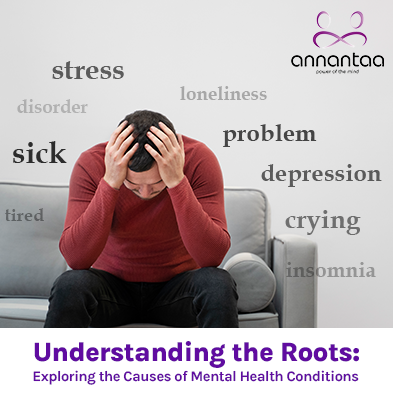
Aysha is a highly successful young professional who has been feeling overwhelmed and anxious for some time now. She brushes off her symptoms as a byproduct of crippling work pressure. But with time these symptoms begin to intensify, affecting her work and personal life. It is not until a close friend expresses concern, that Aysha considers seeking professional help from a mental health expert who offers personalised therapy services. This is where early intervention could have helped Aysha understand and manage her condition before it escalated into something more severe.
Experiencing mental health challenges can be quite stressful and in such situations, each day is different. On some days you might experience an overwhelming flood of emotions and feel melancholic solitude on other days.
Getting better from mental health struggles takes time, but it’s totally doable with help from experts. Moreover, experts state that lack of awareness and choosing to remain in denial are some of the reasons that allow mental health concerns to linger on for much longer.
The social stigma that is attached to mental health issues can also prolong suffering and hinder recovery. Therefore, it is important to confront and dismantle the stigma surrounding mental health to foster a supportive environment for those in need.
Understanding what is early intervention
Early intervention refers to a proactive approach that involves identifying and addressing mental health concerns during the initial days, with the hope of preventing escalation into more severe or chronic conditions.
This approach involves comprehensive assessments, including evaluating a person’s behaviour, and emotional and cognitive functioning. A mental health evaluation assessment provides a baseline for developing a personalised treatment plan that addresses the individual’s problems and ensures they receive appropriate care that will allow them to lead happy and healthy lives.
Why does early intervention matter?
As discussed above, in all cases related to mental health concerns, early intervention is crucial in addressing mental health problems. Identifying and responding to the signs and symptoms early can lead to more effective treatment, improved outcomes, and a better quality of life for those affected. Mental health concerns encompass a wide range of conditions, from depression and anxiety to bipolar disorder and others. Early intervention can be especially helpful, and if you’re in Kolkata, there are therapists in Kolkata who specialize in helping individuals with a variety of mental health concerns.
Let us examine why it matters:
- Improved prognosis: Early detection and treatment can prevent the progression of mental health concerns, making them easier to manage thus putting you on the path to recovery.
- Reduced severity: Addressing mental health concerns can help reduce the severity of the problem, minimising the impact on the individual’s life and functioning.
- Enhanced quality of life: Timely intervention is crucial in helping individuals maintain better relationships, ensure performance at their place of work, and ascertain their overall well-being.
- Cost-effectiveness: If a condition is allowed to persist, it shall manifest more severely later. This involves a huge cost, if not addressed early on. Early treatment is more cost-effective, reducing the need for more intensive and expensive interventions.
Common early signs and symptoms of mental health problem
Although we have talked about the importance of early intervention, more often than not, recognizing these early signs of mental health problems can be quite challenging as they manifest in very subtle ways and can vary widely among individuals. Here are some signs and symptoms that you must look out for:
Changes in mood
One of the most noticeable early signs of recognizing mental health problems is a change in a person’s mood. This can include:
- Depression or persistent sadness: Suffering from feelings of sadness, hopelessness, or emptiness for extended periods. One needs to recognize such patterns as more than just having a bad day, as it is a permeating sense of despair that does not go away.
- Excessive anxiety or worry: Constantly feeling on edge, anxious, and fearful even in situations that do not warrant such a response.
- Mood swings: Experiencing changes in mood, such as a sudden shift from bouts of feeling very happy to experiencing extreme sadness without a clear trigger.
Changes in behaviour
Behavioural changes also accompany mental health issues and are more recognizable than other signs. This can include:
- Withdrawal from social activities: Avoiding social activities and interactions that were once enjoyable. Isolation from family and friends is also another sign that the person might be suffering.
- Changes in sleep pattern: Experiencing insomnia or hypersomnia is another sign of some underlying problem. Irregular sleep patterns can exacerbate other symptoms and severely impact a person’s mental health.
- Changes in eating patterns: Significant weight loss, unusual eating habits, and or changes in appetite, can be indications of mental health issues such as eating disorders or depression.
Physical symptoms
Sometimes symptoms of a mental health problem manifest through physical symptoms that are often overlooked. This includes:
- Unexplained chronic pain: Chronic pain without a clear physical cause shall interfere with your daily life activities.
- Fatigue: Persistent tiredness or unexplained lack of energy that does not improve with time and much-needed rest.
- Psychosomatic symptoms: These symptoms cause distressing physical problems which are a consequence of the autonomic system not performing properly. It can cause problems related to digestion, blood pressure, and others.
Cognitive changes
A person’s cognitive functions might also be affected by mental health problems. This might include:
- Negative Thinking: Persistent bad thoughts, feelings of excessive guilt, or worthlessness. Such thoughts can be overwhelming and if not recognised early on can severely impact a person’s ability to function.
- Difficulty concentrating: Having difficulty in remembering, or persistent trouble in focusing are symptoms that also affect one’s life, and work.
- Distrust and paranoia: Unjustified mistrust of someone, puts a strain on relationships and leads to social isolation.
Recognizing these early signs and symptoms of mental health disorders is a critical step toward ensuring one gets the help that they need. Being aware of these signs shall allow you to take charge of your life or help someone in their journey to a more fulfilling and healthier life.
But it is very important to remember that you must not try to diagnose yourself or your loved one, instead take a compassionate approach in ensuring that you or your loved one visits a well-known psychologist who in turn will guide them on the path to healing.
Moreover, experiencing some symptoms does not necessarily indicate a mental problem, and at the same time, it is important to seek professional evaluation for early assessment and care, thus providing you with complete peace of mind.
What to do when you notice such signs or symptoms
If you or someone you know is suffering from mental health concerns, it is crucial that you take immediate action. These include:
- Have an open line of communication: Encourage open and honest conversations about mental health, as talking about experiences and feelings can help reduce stigma and encourage others to seek professional help as well.
- Educate yourself: Learn more about mental health concerns, their symptoms, and available treatments. Understanding that knowledge is a powerful tool in managing mental health is essential.
- Practice self-care: Engage in activities that promote mental and physical well-being such as exercising, healthy eating, and mindfulness practices.
- Build a support system: Surrounding yourself with supportive family and friends is very important, as they can provide the required emotional and mental assistance one needs when battling such challenges.
- Seek professional help: Contact a mental health expert, like a psychologist for a comprehensive evaluation and diagnosis.
Examples of Early Signs in Different Age Groups
Below we have discussed some of the early signs of mental health problems that one might notice in various age groups:
Children and adolescents:
- Acting out: Behavioural issues like defiance, temper tantrums, and aggression. These behaviours are more persistent and intense compared to typical childhood behaviour patterns.
- Changes in school performance: Sudden drop in grades, difficulty concentrating, and a lack of interest in school activities. These changes might indicate underlying issues like anxiety or depression.
- Social isolation: Withdrawal from friends and family, avoidance of social activities, and increased time spent alone. This can be a sign of social anxiety, depression, or other concerns.
Adults
- Difficulty in coping with daily tasks: Adults might struggle with everyday responsibilities such as work and/or household chores. One might experience feelings of overwhelm and be unable to manage the stress.
- Neglecting responsibilities: One might start ignoring important tasks and commitments they have, leading to problems at work or in personal relationships.
- Appetite and weight changes: Some people might start eating less or more, leading to rapid weight loss or gain, making it another warning sign to look out for.
Role of stigma on mental health
The stigma surrounding mental health issues manifests in various forms including self-victimisation, societal attitudes, and institutional policies. These negative perceptions can lead to discrimination, isolation, and reluctance to seek help.
- Social stigma: Individuals with mental health concerns face social exclusions. Friends, family, and colleagues might show a refusal to understand the problem, leaving affected individuals to feel unsupported and isolated.
- Delayed treatment: The fear due to judgement and discrimination may stop someone from seeking any timely help. This delay can exacerbate symptoms and make recovery more difficult.
- Workplace discrimination: In many cases, when in professional settings employees may fear disclosing their mental health struggles due to potential discrimination. This fear prevents people from accessing necessary support that will put them on the path to recovery.
- Self-victimisation: Internalising societal stigma leads to individuals feeling shame and guilt about their condition. Their self-victimisation can lead to low self-esteem and further hinder their willingness to seek help.
- Healthcare barriers: Stigma can also influence the attitude of healthcare workers, leading to dismissive or inadequate care. This makes it important to consult with such a professional who can treat your case with much-needed empathy and care.
Resources for help and support
Seeking help from a qualified mental health professional is crucial for addressing mental health issues effectively. Professionals like psychologists provide personalised therapy services that help a person with an accurate diagnosis, tailored treatments, and essential support one needs during such a difficult time. Early intervention can prevent problems from escalating, improve quality of life, and other strategies for coping. It is important to remember that you must never hesitate to reach out for professional help to ensure proper support and essential care.
Conclusion
Let us take a stand against the stigma surrounding mental health. Mental health concerns will continue to linger as long as stigma and denial persist. Early intervention has a substantial impact on an individual’s road to recovery and overall happiness. Moreover, it is essential to remember that there is no shame in seeking support for your mental health, and thus take the first step towards recovery and paving a path for a healthier life. Chat with us for further guidance and assistance.


